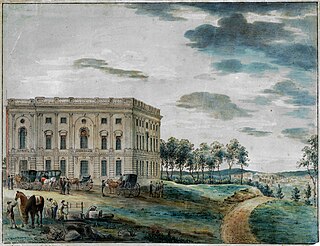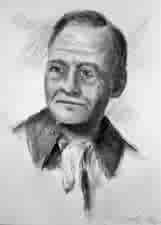
The 10th United States Congress was a meeting of the legislative branch of the United States federal government, consisting of the Senate and the House of Representatives. It met in Washington, D.C. from March 4, 1807, to March 4, 1809, during the seventh and eighth years of Thomas Jefferson's presidency. The apportionment of seats in the House of Representatives was based on the 1800 census; both chambers had an overwhelming Democratic-Republican majority.

The 11th United States Congress was a meeting of the legislative branch of the United States federal government, consisting of the United States Senate and the United States House of Representatives. It met in Washington, D.C. from March 4, 1809, to March 4, 1811, during the first two years of James Madison's presidency. The apportionment of seats in the House of Representatives was based on the Second Census of the United States in 1800. Both chambers had a Democratic-Republican majority.

David Stone was the 15th governor of the U.S. state of North Carolina from 1808 to 1810. Both before and after his term as governor, he served as a U.S. senator, between 1801 and 1807 and between 1813 and 1814.

Alexander Campbell was a National Republican politician from Ohio. He served in the United States Senate.
The 1808 and 1809 United States House of Representatives elections were held at various dates in different states between April 1808 and May 1809 as James Madison was elected president.

Michael Leib was an American physician and politician from Philadelphia. He served as a surgeon in the Philadelphia Militia during the American Revolutionary War. He served as a Democratic-Republican member of the Pennsylvania House of Representatives three times; from 1795 to 1798, 1806 to 1808 and 1817 to 1818. He served as a member of the United States House of Representatives for Pennsylvania's 2nd congressional district from 1799 to 1803 and for Pennsylvania's 1st congressional district from 1803 to 1806. He served as a member of the United States Senate for Pennsylvania from 1809 to 1814. He also served as a member of the Pennsylvania State Senate for the 1st district from 1818 to 1821.

Ephraim Bateman represented New Jersey in the United States Senate from 1826 to 1829 and in the United States House of Representatives from 1815 to 1823.
William Baylies was a U.S. Representative from Massachusetts, and brother of congressman Francis Baylies. His great-grandfather was Thomas Baylies, an ironmaster from Coalbrookdale, England, who emigrated to Boston in 1737.
The 1808 and 1809 United States Senate elections were elections that had the Federalist Party gain one seat in the United States Senate, and which coincided with the 1808 presidential election. The Federalists had gone into the elections with such a small share of Senate seats that even if they had won every election, they would have still remained a minority caucus.

The 1808 United States House of Representatives elections in New York were held from April 26 to 28, 1808, to elect 17 U.S. Representatives to represent the State of New York in the United States House of Representatives of the 11th United States Congress. At the same time, a vacancy was filled in the 10th United States Congress.

The 1808 United States Senate election in Pennsylvania was held on December 13, 1808. Michael Leib was elected by the Pennsylvania General Assembly to the United States Senate.
A special election was held in Vermont's 1st congressional district on September 6, 1808 to fill a vacancy caused by the resignation of James Witherell (DR) on May 1 of the same year, to accept a position as judge of the Supreme Court of Michigan Territory.

The 1808 United States elections elected the members of the 11th United States Congress. The election took place during the First Party System. In the aftermath of the Embargo of 1807, the Federalists picked up Congressional seats for the first time since their defeat in the 1800 election. However, the Democratic-Republican Party maintained control of the Presidency and both houses of Congress.
The 29th Massachusetts General Court, consisting of the Massachusetts Senate and the Massachusetts House of Representatives, met in 1808 and 1809 during the governorship of Levi Lincoln Sr. Harrison Gray Otis served as president of the Senate and Timothy Bigelow served as speaker of the House. In 1808, the state legislature elected James Lloyd as the Class 1 United States Senator from Massachusetts to succeed John Quincy Adams following his resignation on June 8, 1808.

American politician John Quincy Adams served as President of the United States (1825–1829) and United States Secretary of State (1817–1825). Prior to being president, he had served as United States Senator from Massachusetts (1803–1808) and had diplomatic experience as United States Minister to United Kingdom (1815–1817), Russia (1809–1814), Prussia (1797–1801) and the Netherlands (1794–1797). After losing the 1828 presidential election, he served as a member of the U.S. House of Representatives from Massachusetts for 17 years. He is the only American president to be elected to the House of Representatives after leaving office.